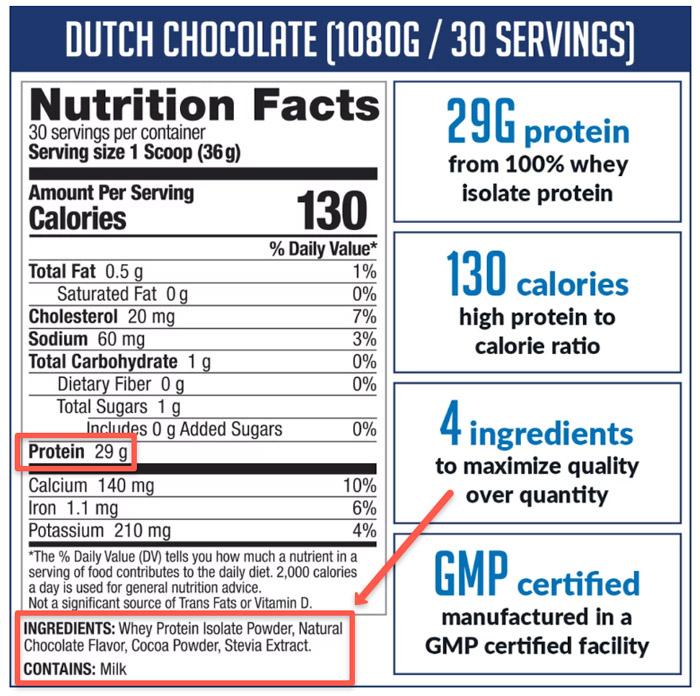Are you new to the world of protein supplements and powders? Feeling confused by all the different types and marketing claims? You’re not alone.
Choosing your first protein supplement can seem daunting. There’s way too many options out there – and quite frankly, most of them are crap.
But fear not, this comprehensive beginner’s guide will simplify everything you need to know protein supplements.
We’ll break down the basics of protein, how to identify quality protein products, and how to incorporate protein into your routine for best results. By the end of this guide, you’ll feel confident to make informed decisions about shopping for protein and using protein to support your fitness journey.
Understanding Protein and Its Importance
What Is Protein?
Protein is a vital macronutrient found in a wide variety of foods, ranging from meat to plant-based sources. Composed of smaller units called amino acids, proteins are essential for many bodily functions. There are 20 amino acids, 9 of which are classified as essential amino acids because the human body cannot produce them and must obtain them from dietary sources.
Role of Protein in Muscle Building and Recovery
Protein plays a crucial part in muscle growth and recovery, as it contributes to muscle protein synthesis. After exercising or participating in intense physical activities, your muscles endure micro-tears and damage. In response, the body uses protein and its amino acids to repair and rebuild these muscles, allowing them to become stronger and more resilient over time. Hence, adequate protein intake is vital for achieving fitness goals and maintaining muscle health.
Recommended Protein Intake for Fitness Enthusiasts
So how much protein should you take?
For those looking to optimize their protein intake, numerous factors should be considered, such as age, gender, and activity level.
General guidelines recommend consuming 0.7 grams of protein per pound of body weight for sedentary individuals.
However, fitness enthusiasts and athletes may require 0.7 to 1 gram of protein per pound of body weight daily to support muscle growth and recovery effectively.
Making sure to incorporate a range of protein-rich foods in your diet or supplementing with protein powders can help to achieve these protein targets.
Types of Protein Powders and Their Sources
Dairy-Based Proteins: Whey and Casein
Whey protein is a popular dairy-based protein powder derived from milk, which makes it a complete protein containing all nine essential amino acids.
It comes in two main forms: whey protein concentrate and whey protein isolate. Casein protein is another milk-based protein that digests slower than whey, allowing for a more sustained release of amino acids.
| Dairy-Based Protein | Source | Benefits |
| Whey | Milk | Fast absorption, complete protein |
| Casein | Milk | Slow digestion, extended release |
Plant-Based Proteins: Pea, Rice, Hemp, and Soy
Pea protein is a vegan-friendly option that contains essential amino acids. It is often blended with other plant-based protein sources, like rice or hemp, to form a complete protein. Rice protein is another plant-based protein made from brown rice, while hemp protein is derived from hemp seeds and boasts additional omega-3 and omega-6 fatty acids. Soy protein is a complete plant protein rich in amino acids, making it a popular choice for vegans and those with dairy allergies.
- Pea: High in essential amino acids, vegan, blends well
- Rice: Vegan, hypoallergenic
- Hemp: Omega-3 and omega-6 fatty acids, vegan, fibrous
- Soy: Complete plant protein, vegan, versatile
How to Choose High-Quality Protein Powder
Assessing Protein Quality
When selecting a protein supplement, it’s crucial to evaluate its quality. Consider factors such as biological value of the protein, which indicates how efficiently the body can absorb and utilize it. Whey protein and whey isolates are typically the best options for muscle growth. Whey isolate is the purest form and therefore, usually the most expensive.
Importance of Amino Acid Profile
A high-quality protein powder should contain all nine essential amino acids. These amino acids, also known as BCAAs or branched-chain amino acids, are necessary for the body to function properly, but cannot be produced internally. Including a protein supplement with a complete amino acid profile in your diet can contribute to overall health and fitness progress.
Reading Nutrition Labels and Ingredients
When choosing a protein powder, carefully examine the nutrition label and ingredients list. Opt for products with clean, easy-to-understand ingredients without unnecessary additives.
Look for a short list consisting primarily of the protein source, such as whey isolate.
A high-quality example is Built With Science Whey Isolate Protein Powder, which contains only four ingredients and delivers 29g of protein per serving.

If you do a quick search on Amazon for protein powders, it is nearly impossible to find a comparable protein with so few ingredients.
Avoid added sugars and artificial sweeteners as these may hinder weight loss goals. “Natural flavors” and sucralose should also be avoided, as artificial sweeteners have been linked to disrupting the gut microbiome.
Instead, select options with excellent macronutrient profiles and delicious natural flavors. When possible, natural sugar alternatives like Stevia are preferable to artificial sweeteners
Incorporating Protein Powder into Your Diet
Using Protein Powder for Muscle Gain
Protein is essential for muscle growth and repair, making protein powder a popular choice for individuals looking to increase their muscle mass. One way to achieve this is by consuming a protein shake post-workout, as it can help stimulate muscle protein synthesis. It’s crucial, however, to maintain a balanced diet and incorporate other protein sources as well.
Weight Management and Protein Shakes
Incorporating protein shakes into your diet can be beneficial for weight loss too. Higher protein intake can aid in satiety, reducing cravings and overall calorie consumption. For optimal results, replace one meal per day, such as breakfast, with a protein shake and focus on whole foods for other meals.
Creative Ways to Use Protein Powder in Recipes
Protein powder isn’t limited to shakes; it can be incorporated into various recipes, adding a protein boost to your meals. Some popular options include:
- Smoothies: Mix protein powder with fruits, vegetables, and liquids like water or almond milk for a nutritious drink.
- Pancakes: Add protein powder to your pancake batter for a high-protein breakfast option.
- Baked goods: Incorporate protein powder into muffins, cookies, or brownies for a healthier treat.
- Yogurt: Mix protein powder into a bowl of Greek yogurt for an extra protein boost.
By finding creative ways to include protein powder in your diet, you’ll be able to optimize your protein intake and support your fitness goals more effectively.
When to Consume Protein Powder
While there’s no one-size-fits-all answer, it’s generally recommended to consume protein powder within 30 minutes of a workout to help with muscle recovery. However, you can also use protein powder as a meal replacement or snack throughout the day to increase your protein intake.
Timing Your Protein Intake
Pre-Workout and Post-Workout Nutrition
When it comes to exercise and resistance training, it’s essential to fuel your body properly before and after your workout. Consuming a protein shake before your workout can provide your body with the necessary amino acids for muscle growth and consistent energy levels. On the other hand, a post-workout protein shake can help supply your body with the building blocks it needs to repair and grow muscles, especially after intense resistance training.
As a general rule, aim for 20 to 30 grams of protein in your shake. It is recommended to consume your pre-workout shake about 30 minutes before and your post-workout shake within 30 minutes after finishing your exercise. This timing ensures you are providing your body with the necessary nutrients at the right time for optimal muscle growth and recovery.
The Role of Protein in Recovery and Growth
Muscle growth and recovery are heavily influenced by the availability of amino acids in the body, which can be obtained from protein sources like protein powder. Amino acids are the fundamental building blocks of muscles, making them essential for tissue repair and growth after exercise. Consuming protein post-workout can particularly improve muscle protein synthesis, supporting the repair and growth of your muscles.
It’s also beneficial to spread your protein intake evenly throughout the day, ensuring that your body has a constant supply of amino acids for muscle maintenance and growth. Research has found that consuming an adequate serving of protein (at least 20 to 30 grams), starting at your first meal of the day, will support muscle protein synthesis more effectively.
Supplement to Cover Gaps
Protein powder can help supplement your diet to meet daily protein needs. As a 150-pound person, your goal is approximately 150 grams of protein per day.
Eating four meals should provide around 37.5 grams of protein each. However, it may be difficult to reach this amount at every meal.
If your daily protein from meals totals 120 grams, you have a 30 gram deficit. Drinking a protein shake allows you to easily consume extra protein to cover this gap and reach your 150 gram target. Supplementing strategically ensures your body receives sufficient protein throughout the day.
Choosing a Protein Powder That’s Right for You
Understanding Your Health and Fitness Goals
When selecting a protein powder, it is crucial to consider your health and fitness goals. For bodybuilders or athletes looking to build muscle, choosing a product with high biological value is essential, such as whey isolate protein powder. If your goal is weight loss, opt for protein powders with no added sugars or dextrins/maltodextrins.
Evaluating Protein Powders for Specific Dietary Needs
It’s important to choose a protein powder that aligns with your dietary preferences and restrictions. For vegans, plant-based options such as soy, pea, or hemp protein powders are more suitable. Those with nut allergies should be cautious when selecting a product, ensuring that the protein powder does not contain traces of nuts or nut-derived ingredients.
| Dietary Needs | Suggested Protein Powders |
| Vegan | Soy, Pea, Hemp |
| Nut Allergy | Read labels carefully |
Dietary Considerations
Dietary considerations also play a role in choosing the right protein powder. For those who are lactose intolerant or have a dairy allergy, plant-based protein powders like pea or soy protein are good options. Casein protein is another alternative for those who want a slow-release protein powder.
Taste and Mixability
Finally, taste and mixability are important factors to consider. Some protein powders may have a chalky texture or an unpleasant aftertaste. It is a good idea to try different flavors and brands to find one that tastes good and mixes well.
Some powders contain a low ratio of protein per serving or require a large volume of powder to reach your protein needs. For example, BWS protein only requires one big scoop and packs 29 grams of protein in one serving. Less powder typically mixes better and requires less liquid
Making an Informed Purchase
Examine the nutritional label, ingredients, and price of various protein powders to make an informed decision. A higher-priced product may provide better quality ingredients or a more suitable protein source for your needs. Don’t forget to consider taste, as it plays an essential role in ensuring you consistently consume the protein powder. Lastly, read reviews and seek recommendations from fitness enthusiasts or professionals to help you make the best choice.



